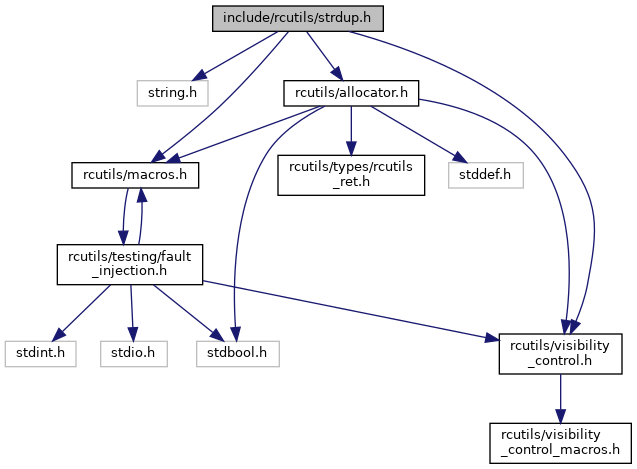#include <string.h>#include "rcutils/allocator.h"#include "rcutils/macros.h"#include "rcutils/visibility_control.h"
Go to the source code of this file.
Functions | |
| char * | rcutils_strdup (const char *str, rcutils_allocator_t allocator) |
| Return a duplicated string with an allocator, or null if an error occurs. More... | |
| char * | rcutils_strndup (const char *str, size_t string_length, rcutils_allocator_t allocator) |
| Return a duplicated string with an allocator, or null if an error occurs. More... | |
Function Documentation
◆ rcutils_strdup()
| char* rcutils_strdup | ( | const char * | str, |
| rcutils_allocator_t | allocator | ||
| ) |
Return a duplicated string with an allocator, or null if an error occurs.
This function is identical to rcutils_strndup() except the length of the c string does not have to be given and therefore the c string must be null terminated.
- See also
- rcutils_strndup()
- Parameters
-
[in] str null terminated c string to be duplicated [in] allocator the allocator to use for allocation
- Returns
- duplicated string, or
-
NULLif there is an error.
◆ rcutils_strndup()
| char* rcutils_strndup | ( | const char * | str, |
| size_t | string_length, | ||
| rcutils_allocator_t | allocator | ||
| ) |
Return a duplicated string with an allocator, or null if an error occurs.
This function can fail and return null if memory cannot be allocated or if the input c string pointer is null. In both cases no error message is set. The returned string should be deallocated using the given allocator when it is no longer needed.
The string_length given does not include the null terminating character. Therefore a string_length of 0 will still result in a duplicated string, but the string will be an empty string of strlen 0, but it still must be deallocated. All returned strings are null terminated.
- Parameters
-
[in] str null terminated c string to be duplicated [in] string_length length of the string to duplicate [in] allocator the allocator to use for allocation
- Returns
- duplicated string, or
-
NULLif there is an error.
 1.8.17
1.8.17